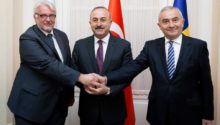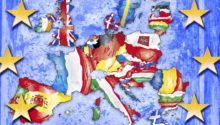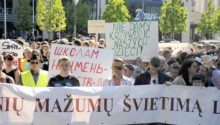contributors
Vladislav Gulevich

Political scientist, analyst at the Center for Conservative Studies at the Sociology Department of Moscow State University of International Relations
all articles


Poland’s National Independence Day, celebrated on 11 November, has caused the Ukrainian authorities yet more grief. The date itself commemorates the anniversary of the restoration of Poland’s sovereignty in 1918, marked by the armed conflict that took place between Polish troops and forces on the territory of Galicia in the West Ukrainian People’s Republic (ZUNR). Large-scale fighting continued from November 1918 through to July 1919 and ended with the complete defeat of the ZUNR.


The simultaneous official visits of Polish Foreign Minister Witold Waszczykowski and Romanian Foreign Minister Lazăr Comănescu to Turkey at the end of August, where they met with Turkish Foreign Minister Mevlüt Çavuşoğlu and Turkish President Recep Erdoğan, were a continuation of the trilateral Polish-Turkish-Romanian consultations that began in June of this year in Warsaw…


In July 2016, while swearing in 105 Polish soldiers being promoted to the rank of podporucznik (roughly equivalent to the rank of second lieutenant and a junior officer rank of the Polish Army), the Minister of National Defence for Poland, Antoni Macierewicz, announced Warsaw’s military plans for the near future…


Every July Poland is rocked by internal debates about Ukraine’s historical responsibility for the 1943 Volhynia massacre. And 2016 was no exception. The current ruling party is Jarosław Kaczyński’s Law and Justice party (PiS), which took power largely based on its promise to raise the topic, during its negotiations with Kiev, of the massacre of the Polish population of Volhynia at the hands of the butchers from the Organization of Ukrainian Nationalists-Ukrainian Insurgent Army (OUN-UPA)…


On Monday, June 27, the Polish state news channel, TVP Info, reported that at a meeting in Prague, German Foreign Minister Frank-Walter Steinmeier and his French counterpart Jean-Marc Ayrault presented the top diplomats from the Visegrád Four (Poland, Hungary, the Czech Republic, and Slovakia) with a nine-page document that included a plan to create a «European superstate». The Polish television station described the document as an «ultimatum», referring to the fact that the constituents of this prospective superstate would lose their sovereign right to their own armed forces, national currency, and separate tax system. What’s more, the member states of the proposed supranational entity would lose control over their own borders, as well the procedures for admitting and relocating refugees…


After it became known that the Romanian authorities are planning to accept 6,200 refugees between 2016 and 2017 at the behest of Brussels, the prime minister of neighbouring Hungary, Viktor Orban, issued an order to the country’s Ministry of Internal Affairs and its Defence Ministry to build a wall along the border to prevent illegal immigrants entering Hungary from Romania…


«No to assimilation!» – «We must protect our children – our future!» – «Yes to the accreditation of schools for ethnic minorities!» These were the slogans chanted during a March 17 demonstration in Vilnius by teachers and students from the local Polish schools who were protesting the eradication of Polish-language education…


«You wanted democracy? You have it! Democracy is the tyranny of the majority. The Law and Justice Party [abbreviated to PiS] was supported by the majority of Poles. Now it can do whatever it wants. The oppressed people voted for the PiS because they wanted to see the members of previous government behind bars where they belong… The European Union should be dissolved», said Polish MEP Janusz Korwin-Mikke addressing the European Parliament…


While the Ukrainian government holds forth on the advantages of European integration, lawsuits are mounting in Poland that demand compensation for the damages incurred by the former owners of real estate in western Ukraine in 1939 when Galicia and Volhynia were incorporated into the Ukrainian Soviet Socialist Republic…


Russian Ambassador to Poland Sergei Andreev has prompted an outrage of Polish Ministry of Foreign Affairs putting some of the blame for World War II on Poland. The Ministry responded saying the narrative presented by Russian Ambassador «challenges historical truth and invokes some of the most mendacious interpretations of events». In reality the words of Ambassador dovetail with historic facts…



